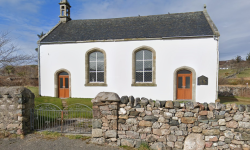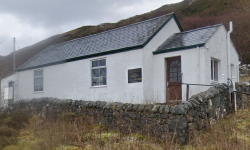John Thompson, Durness
John Thompson was born in 1735. He was a schoolmaster in Golspie before being licensed by the Presbytery of Dornoch in 1863 and ordained by the Presbytery of Tongue in 1864. Donald Sage, in Memorabilia Domestica, gave the following estimate of him:
Two other eminent members of the Presbytery of Tongue were Mr. John Thomson, of Durness, and Mr. William Mackenzie, of Tongue. Mr. Thomson was a native of the parish of Avoch in the Black Isle. When settled minister of Durness, he was deficient both in Gaelic and in sound theology. The former defect he never overcame; not so, however, with regard to his theology. He had not been minister of Durness many years when it underwent a decided change.
His doctrine, at first, had been a mixture of law and gospel, grace and good works, not, however, placed in their proper and scriptural relation. Rob Donn, in a poem which he composed on the clergy of a former generation the predecessors of those who have been named remarks that, “one of them may be found who on a Sabbath day will assert that Christ is our Saviour, but who, week after, will declare that there is no profit but in works; at one time he will fly so high and, anon, he will creep so low that, being like neither a bird nor a mouse, he makes of himself a filthy bat.”
“Giheibhear fear dhiu, là sàbaid.
Their gur Slànaighear Criosd dhuinne;
‘S their e, seachduinn o’n là sin,
Nach eil stà ach an gniomh’raibh;
Bheir e iteagan arda,
‘S ni e màgaran iosal;
‘S o nach eun e ‘s nach luchag,
Ni e trusdar do dh’ialtaig”
Mr. Thomson at first preached in such a strain as this, and, having neither the powers of oratory nor of mind to shape his doctrines into a regular system, nor anything like intelligible language to convey it, his preaching was rejected by the pious and scoffed at by the profane.
Having preached a sermon on one occasion at Eriboll, a place within the boundaries of his parish, some of the best and most eminent Christians among his hearers were highly dissatisfied. At a fellowship meeting held at the same place the next day, at which Mr Thompson presided, they resolved to give out a question bearing on his doctrine. It was taken up and discussed. Mr. Thomson saw their device, and, highly offended, dismissed the meeting. The attack, however, led him to reflect and to test his own views by the Scriptures, the result being that, after many private conferences with his co-presbyter, Mr. William Mackenzie, he retracted his erroneous opinions, eagerly embraced the gospel, and preached it to his people. He became thereafter a zealous and devoted servant of Christ, and, to the close of his life, was a most exemplary pattern of that “simplicity and godly sincerity” by which the Spirit of Christ is most clearly manifested. He died in 1811, and was succeeded by his son-in-law, Mr. William Findlater, who was inducted in 1812.1
Memorabilia Domestica, p39-40.
Hew Morrison wrote of the relationship between Thompson and Rob Donn:
With the Rev. John Thomson, who succeeded Mr Macdonald in the pastoral charge of Durness in 1763, Rob did not get on well at first, and indulged in satirical sallies at the expense of his minister, although afterwards it is stated that they became good friends. Mr Thomson’s upright conduct, high moral character, and honest and diligent discharge of his ministerial duties, impressed the poet in common with the people of the parish. Shortly after Mr Thomson’s induction, Rob was in Thurso, where he was met by the Rev. Dr Nicolson, who, while a clergyman of acknowledged ability, did not display any great diligence or zeal in his calling. Expecting to be entertained by one of the bard’s witful sallies at Mr Thomson’s expense, Dr Nicolson inquired, ‘Well, and how does Mr Thomson nowadays?’ ‘Mr Thomson,’ replied the bard, “is doing what you never did or will do — he is doing his best.’
“Hew Morrsison, Songs and Poems in the Gaelic Language, Edinburgh, 1898.
Footnote (from Memorabilia Domestica)
1Mr. John Thomson was a man of great Christian simplicity, but very peculiar in his manner. When he preached, or when he expressed himself keenly in any argument, he had an odd habit of spitting in his fist. His powers of utterance, especially in the Gaelic language, being very limited, he made much use of his hand when he spoke, to enforce what he did say. He was the immediate successor of Mr. Murdoch MacDonald, the patron and warmly-attached friend of Rob Donn, with whom, however, Mr. Thomson was by no means such a favourite. The bard, though prejudiced against Mr. Thomson, could not but respect him. But the brother of the minister could not escape the wit of Rob Donn; one of the bitterest of his satires is hurled at the head of poor Lewis Thomson.

